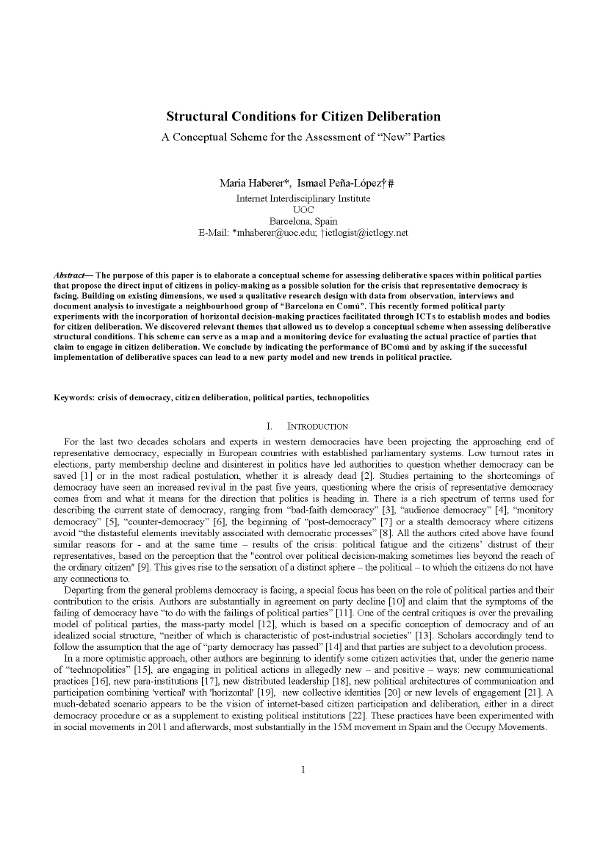
Maria Haberer and I have presented a communication, Structural Conditions for Citizen Deliberation: A Conceptual Scheme for the Assessment of “New” Parties, at CeDEM2016 – International Conference for E-Democracy and Open Government 2016, organized by the Danube University Krems and that took place in May 18-20 2016 in Krems, Austria.
The research is a first approach to the phenomenon of the “network party” (or net-party) — though we are cautious about the naming and prefer so far a more neutral “new party” — and analyzes the case of Barcelona en Comú, the party now in office in the municipality of Barcelona and whose origin is deeply rooted in the 15M Spanish Indignados movement and other recent social movements with a strong technopolitical profile. The approach takes deliberation as the core around which all the organization spins while transitioning from a social movement to a (traditional?) political party.
Below can be found and downloaded the slides and full text of the communication.
Abstract
The purpose of this paper is to elaborate a conceptual scheme for assessing deliberative spaces within political parties that propose the direct input of citizens in policy-making as a possible solution for the crisis that representative democracy is facing. Building on existing dimensions, we used a qualitative research design with data from observation, interviews and document analysis to investigate a neighbourhood group of “Barcelona en Comú”. This recently formed political party experiments with the incorporation of horizontal decision-making practices facilitated through ICTs to establish modes and bodies for citizen deliberation. We discovered relevant themes that allowed us to develop a conceptual scheme when assessing deliberative structural conditions. This scheme can serve as a map and a monitoring device for evaluating the actual practice of parties that claim to engage in citizen deliberation. We conclude by indicating the performance of Barcelona en Comú and by asking if the successful implementation of deliberative spaces can lead to a new party model and new trends in political practice.
Slides
Dowloads
Haberer, M. & Peña-López, I. (2016). “Structural Conditions for Citizen Deliberation. A Conceptual Scheme for the Assessment of “New” Parties”. In Parycek, P. & Edelmann, N. (Eds.), CeDEM16. Proceedings of the International Conference for E-Democracy and Open Government 2016. 18-20 May 2016, Danube University Krems, Austria. Krems: Edition Donau-Universität Krems.
Haberer, M. & Peña-López, I. (2016). “Structural Conditions for Citizen Deliberation. A Conceptual Scheme for the Assessment of “New” Parties”. In Parycek, P. & Edelmann, N. (Eds.), CeDEM16. Proceedings of the International Conference for E-Democracy and Open Government 2016. 18-20 May 2016, Danube University Krems, Austria. Krems: Edition Donau-Universität Krems.
If you need to cite this article in a formal way (i.e. for bibliographical purposes) I dare suggest:
Peña-López, I. (2016) “Communication at CeDEM2016. Structural Conditions for Citizen Deliberation. A Conceptual Scheme for the Assessment of “New†Parties” In ICTlogy,
#152, May 2016. Barcelona: ICTlogy.
Retrieved month dd, yyyy from
https://ictlogy.net/review/?p=4426
 RSS feed for comments on this post.
TrackBack URI
RSS feed for comments on this post.
TrackBack URI

